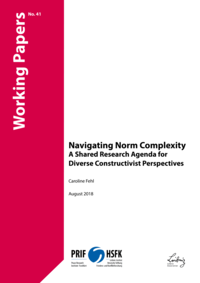Caroline Fehl
Navigating Norm Complexity
A Shared Research Agenda for Diverse Constructivist Perspectives
Kurzbeschreibung
This working paper makes the case for devoting greater attention to problems of norm complexity in international politics, particularly to the social construction of norm relationships. Recent International Relations (IR) research has highlighted that global norms often remain contested and malleable even after their formal adoption, but has focused on exploring the dynamism of single norms. While norm conflicts or synergies are often discussed as “explanatory factors” that may account for the evolution of an individual norm, this paper takes a different perspective: it argues that norm conflicts and norm synergies are themselves the subjects and products of social construction and discursive controversy, and that we need to better understand the dynamics of “norm linkage” that generate different norm relationships. To this end, the paper proposes that constructivist norms scholarship can benefit from an engagement with rationalist theories of regime complexity, on the one hand, and pragmatist-inspired IR scholarship, on the other. By drawing on and contrasting these different perspectives, the paper outlines a joint research agenda that tackles the issue of norm complexity with a range of questions and heuristic tools. To illustrate how the agenda can be put in practice, the paper discusses linkage dynamics between norms of protection (as exemplified by the “responsibility to protect”) and norms of prosecution (as expressed in the International Criminal Court’s Statute) in debates about mass atrocity responses.
[Deutsche Kurzbeschreibung:]
Probleme der Normkomplexität, insbesondere die soziale Konstruktion von Normbeziehungen, stehen im Mittelpunkt dieses Arbeitspapiers. Diese Thematik, so die Ausgangsthese des Papiers, wurde in der Forschung zu globalen Normen innerhalb der Internationalen Beziehungen (IB) bislang vernachlässigt. Zwar haben viele Beiträge zur Normenforschung in den vergangenen Jahren aufgezeigt, dass globale Normen auch nach ihrer formalen Annahme oft Gegenstand von Streit und Neuinterpretationen sind, doch haben sich diese Untersuchungen auf die dynamische Entwicklung einzelner Normen konzentriert. Konflikte und Synergien zwischen unterschiedlichen globalen Normen werden lediglich als „Erklärungsfaktoren“ diskutiert, die die Entwicklung einer einzelnen Norm beeinflussen können. Das vorliegende Arbeitspapier nimmt hier einen Perspektivwechsel vor. Es argumentiert, dass Normkonflikte und -synergien selbst Gegenstand und Produkt sozialer Konstruktion und diskursiver Auseinandersetzungen sind. Dynamiken des „norm linkage“, die positive und negative Normbeziehungen generieren, gilt es daher besser zu verstehen. Zu diesem Zweck, so der Vorschlag des Papiers, können rationalistische Theorien der Regimekomplexität auf der einen Seite, und pragmatistisch inspirierte Beiträge zur IB-Theorie auf der anderen, die konstruktivistische Normenforschung bereichern. Indem es diese unterschiedlichen Ansätze vergleicht und miteinander in Verbindung bringt, skizziert das Papier eine gemeinsame Forschungsagenda zur Thematik der Normkomplexität. Deren mögliche Anwendung illustriert es am Beispiel von Linkage-Dynamiken zwischen Schutz- und Strafverfolgungsnormen (wie sie z.B. in der „Schutzverantwortung“ bzw. im Statut des Internationalen Strafgerichtshofs andererseits zum Ausdruck kommen), die in Debatten über Massenverbrechen und die richtige internationale Reaktion darauf zu beobachten sind.
Bibliographische Angaben
Fehl, Caroline (2018): Navigating Norm Complexity. A Shared Research Agenda for Diverse Constructivist Perspectives, PRIF Working Papers No. 41, Frankfurt/M.

- Name
- PRIF_WP_41.pdf
- Erweiterung
- Größe
- 321,39 KB